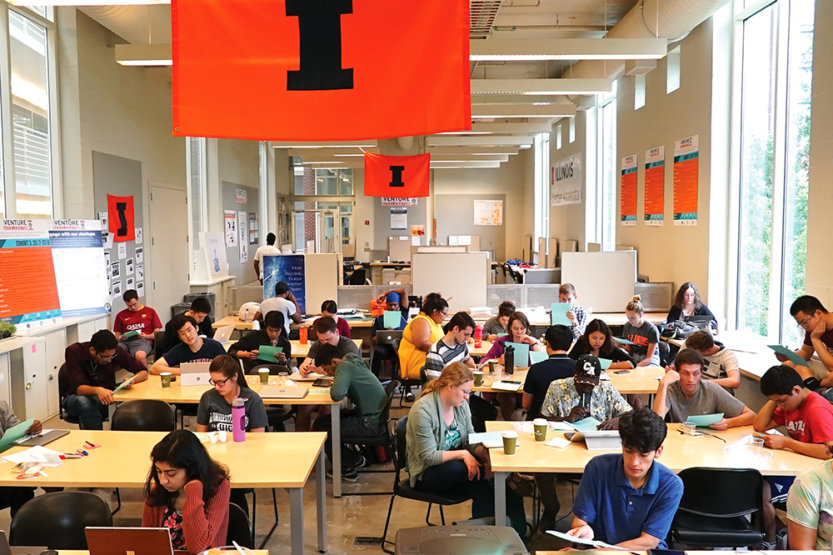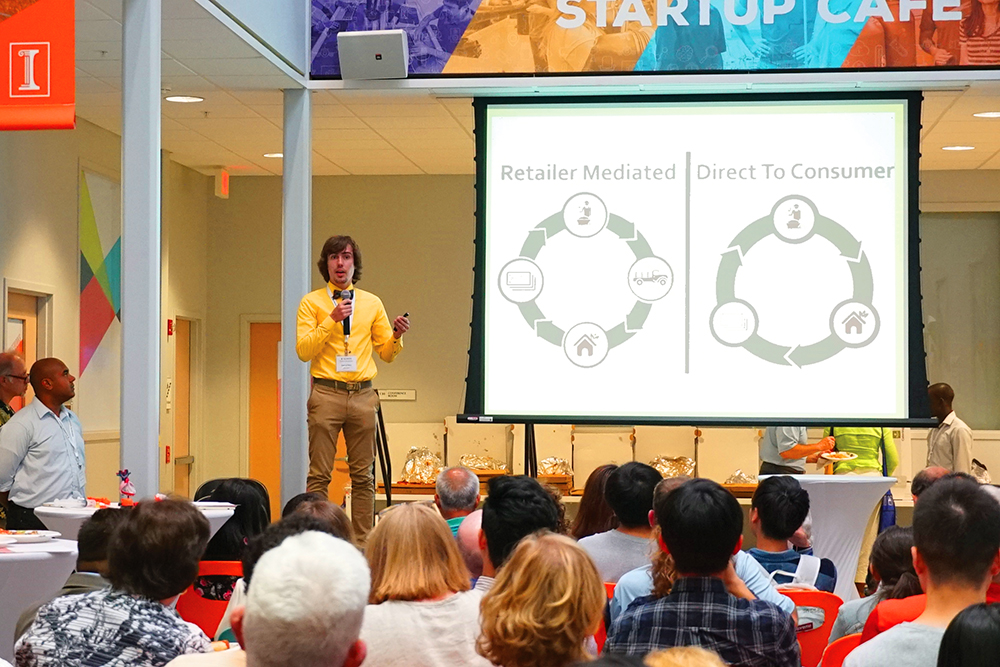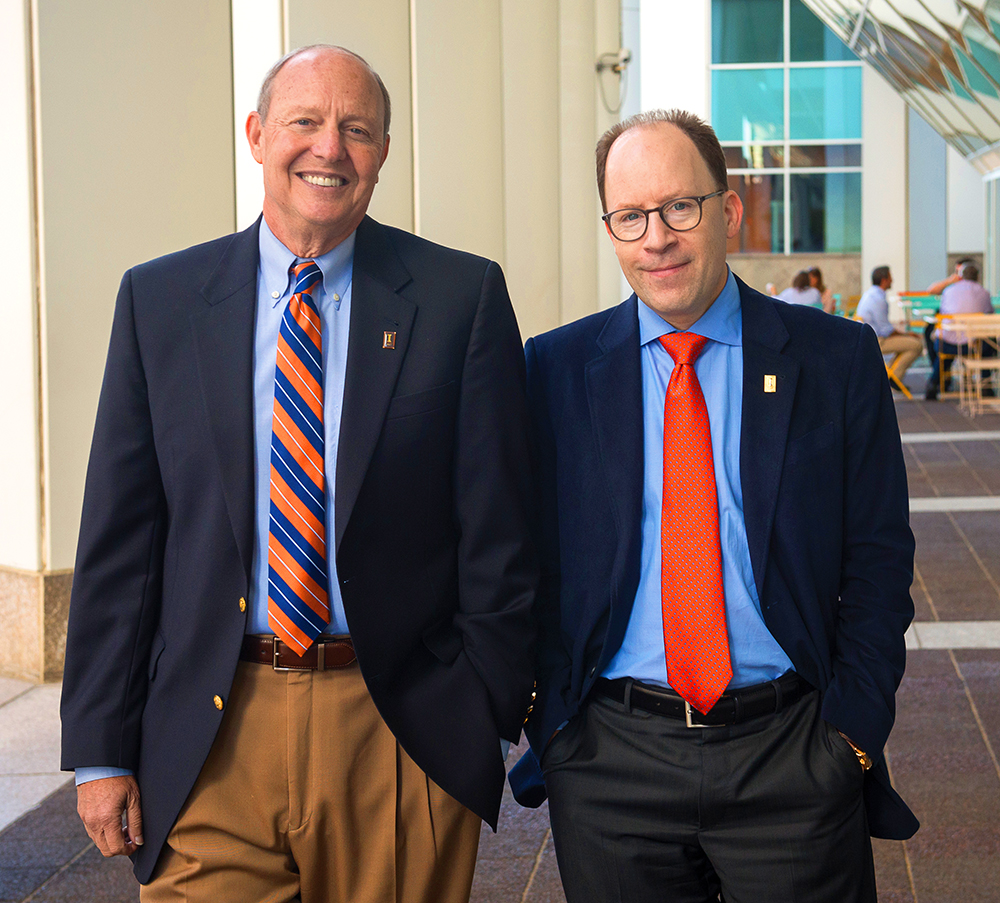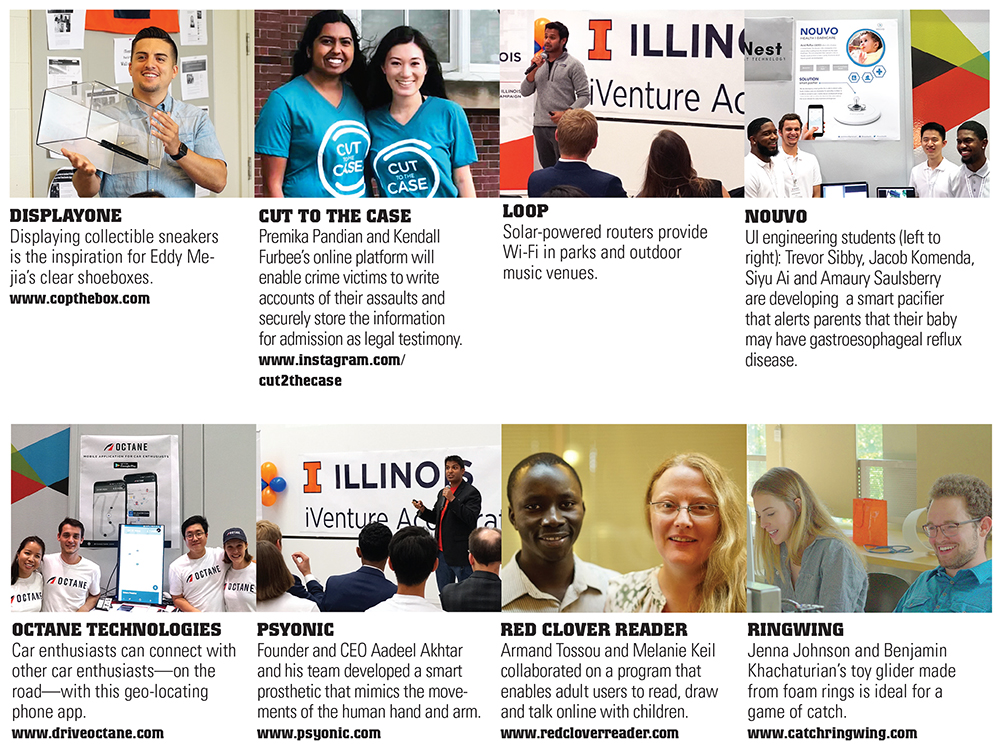Fast Track
 UI’s iVenture Accelerator provides space for student entrepreneurs to work in teams. (Image by Mayank Mehta)
UI’s iVenture Accelerator provides space for student entrepreneurs to work in teams. (Image by Mayank Mehta) It’s a Saturday morning in early March at the Thomas M. Siebel Center for Computer Science. Outside, grim gray rain lashes the Illinois campus. Inside, spirits are high and hopes are bright. Students sit at tables arranged throughout the steel-girded, minimalist elegance of the computing center’s second-floor mezzanine gallery. They glance at laptops, straighten small piles of flyers, smile tacitly at the gathered public.
The students are gathered for the Startup Showcase at the 2019 UI Engineering Open House to share ideas (invariably amazing) and the technology (mostly inaccessible to civilians) at the core of those ideas. The ultimate goal: to attract interest in and support for their budding companies. All have arrived here via course and lab work at the University. But many have been propelled by the dynamic, accommodating initiative known as the iVenture Accelerator.
The PhantomCor team uses a low-tech baking pan to display brown gel studded with weird green nodes. Unsettling as it may look, this is innovative material, made to be shaped into models of human organs—a diseased liver, for example—on which medical students can practice operating procedures. Nearby, a young man reaches for his laptop to demo the Red Clover Reader, a program that allows users to read online with children, and even draw and talk. It also provides a platform for independent authors of children’s books to publish their works. And, speaking of children, how about this? Nouvo is designing a smart pacifier that can alert parents that their baby may have gastroesophageal reflux disease.
A crowd gathers around the Psyonic table, where a team member is demonstrating the company’s smart prosthetic arm. Produced on a 3-D printer and designed to respond to the nerve impulses in an amputee’s stump—in other words, to such mental commands as raise, lower, grasp, lift—the prosthetic deftly mimics the movements of the human hand and arm, with the bonus cyborg extra of a 360-degree twist at the wrist. It’s rechargeable and Bluetooth-enabled. And, for the day it becomes available, not expensive.
In a classroom just off the gallery, a big toy glider is poised at the RingWing table. Designed from foam rings and made to toss short distances in a millennial take on catch, the glider is already on local retail shelves. MakerGirl is here too, promoting academies in which girls ages 7 to 10 learn how to create fun stuff on 3-D printers—and maybe, just maybe, become inspired to pursue studies and careers in science, technology, engineering and math. The startup works with girls in Urbana-Champaign and Chicago—and is allying with Harvard, among other universities—to create more workshops around the nation.
Back at the far end of the gallery, near the coffee stand that supplies Seibel Center technophiles with much-needed caffeine, are two tables displaying student startups, each based on containers. DisplayOne fabricates clear boxes for collectibles, a product originally brainstormed with collectors in mind who prize limited-edition sneakers. The other company, Earnest Earth, is hard at work on compartmented steel bins that deploy bacteria to turn manure into compost—providing (someday, perhaps) an alternative to the nitrogen-based, environmentally problematic fertilizer ubiquitous in large-scale farming.
The student who heads DisplayOne has been talking to the student who founded Earnest Earth about joining that startup’s leadership team. They know each other well and have been working together for awhile—thanks to the iVenture Accelerator.

Intensive together time
iVenture got its start in Fall 2014, when faculty member Noah Isserman, new to campus at the time, was tapped to create initiatives advancing social innovation, a priority in the University’s strategic plan. Isserman, who holds a joint appointment in business administration and social work, was teaching a popular class in social entrepreneurship. “Every year, all of these great student projects with real potential would get started,” Isserman says. “But in the summer, the students would very rarely get to continue that learning. All over campus, we realized, there was a gap.”
Working with members of a UI roundtable on entrepreneurship, he set about exploring the resources available to student startups and worked with campus units and potential donors to raise funds. By that summer, 13 teams of student fellows (and their ideas for companies and nonprofits) had been chosen as the inaugural cohort in the iVenture program. Four years later, the 2018 program had 13 teams and 31 fellows, with a similar number to be tapped for 2019.
The program’s launchpad is its summer “accelerator” phase, providing student fellows with money, resources and guidance to make their business ideas happen. Teams meet Monday through Friday in the accelerator space (several large, sunlit architectural studios in Temple Hoyne Buell Hall). Over 10 weeks, students hurtle through a torrent of workshops, presentations and consultations with faculty, alumni, advisers, businesspeople, community leaders and prospective investors.
There’s also intensive together time—unstructured Tuesdays and Thursdays when team members work together in the accelerator space or at campus labs with equipment such as 3-D printers. Or maybe over coffee at Café Paradiso. The camaraderie is epic. “They all know each other,” Isserman observes. “They trust each other and help each other. They’ll often get absorbed into one another’s teams. This learning community is how and why we founded iVenture.”
While iVenture is part of the Gies College of Business (see sidebar), fellowship is open to all students at Illinois. The program attracts teams across disciplines spanning 10 colleges and 37 majors, and ranging from business and engineering to molecular biology, architecture and industrial design. “The beauty of the program—from its inception—is that it’s multidisciplinary, including the faculty and other campus community members who participate, as well as the students,” observes program director Manu Edakara, ’14 EHS. This year brought the first iVenture team from the University of Illinois at Chicago to Urbana-Champaign to work on its startup, SnapClips, which makes special weight-bar collars for athletic training.
Those chosen for iVenture are not so much lucky as hard-working, innovative, and above all, focused. The selection committee asks applicants to list milestones toward realizing their business ideas, and preferably, to present prototypes and strong marketing strategies. Some startups have already received entrepreneurial honors such as those awarded by the Cozad New Venture Challenge, an annual campus event. Once students are in iVenture, the program’s leadership team helps them come up with key performance indicators and to use those indicators to track their progress.
The privilege of participation is accompanied by a special luxury. Each iVenture fellow gets a $2,500 stipend to offset income that would otherwise have come from a summer job. And each team receives up to $10,000 for materials, services, equipment and other must-haves. Students even get breakfast and a midday meal. “We really do give people free lunches,” Isserman quips. He adds, more seriously, “As far as we know, we are the most generous non-equity-taking student venture accelerator at a university in the world.”
Altogether, the iVenture program is a year long and includes a two-semester seminar on entrepreneurship during the academic year. But the summer is the true accelerator. The 10-week experience culminates in two Demo Days, held in mid-July on campus and in Chicago. iVenture teams present their work to alumni and members of the business community with pride in their ideas and the hope of funds to help them continue to grow their companies and nonprofits. Since 2015, iVenture startups have attracted $8.5 million from outside investors.

Challenges, setbacks, progress, success
More than 150 students (and uncounted interns—many of them prospective future fellows who want to help out and observe) have come through the iVenture Accelerator in the past four years. Of the 36 startups that have nested in the Accelerator, more than a dozen have evolved into full-grown companies, such as Loop (solar-powered routers for Wi-Fi in parks and outdoor music venues), Trala (learning the violin online) and Octane Technologies (a geo-locating phone app that connects car enthusiasts with other car enthusiasts—on the road).
Psyonic—the startup with the smart arm—plans to start selling the prosthetics by the end of the year, once its progenitors can successfully waterproof the device (in its eighth iteration) and attain FDA registration and approval for Medicare coverage. Psyonic was chosen for the initial 2015 iVenture cohort, thanks to which, “We were able to buy our oscilloscopes, our power supplies, basically all our machines and equipment,” says CEO and founder Aadeel Akhtar, MS ’16 ENG, PHD ’16 LAS, MD ’17 UIC, in an interview at the firm’s headquarters. Now housed in EnterpriseWorks at the UI Research Park, Psyonic has come a long way from Ecuador, where Akhtar and his team tested the first prototype in 2014.
iVenture impressed Akhtar as much with its emphasis on social impact as with its resources. “It was refreshing to be with other like-minded entrepreneurs who aren’t just in it for the money but are actually doing social good,” he says. “The community that iVenture built in that first year was really great, and I keep in contact with many of the student team members still.”
MakerGirl—which offers 3-D printing workshops to young girls—is another startup with a social mission that came through the first iVenture Accelerator program. Now led by Stephanie Hein, ’16 LAS, the company shares modest digs with a computer lab at the UI Armory. Intended to initiate participants into STEM, the workshops “always link 3-D printing to a specific industry, such as fashion or sports or food,” Hein says.
Kendall Furbee, a 2017 iVenture fellow, was a freshman in engineering when she met Hein and was inspired to think outside the 9-to-5 box of a conventional career. With campus safety—particularly the safety of women—a passionate concern for her, Furbee and her startup partner, Premika Pandian, ’18 ENG, went through a discovery process, facilitated in the summer accelerator, that helped them narrow their focus to victims of sexual assault. “We talked to hundreds of people—law enforcement, DNA labs, advocates, victims,” Furbee recalls. “The process showed us the importance of knowing your problem before you formulate a solution.” Cut to the Case, the startup Furbee and Pandian created, is an online platform designed to help victims write detailed accounts of their assaults and securely store the information for admission as legal testimony.
Of her own iVenture experience, Furbee observes: “It’s really very intensive but also fun. Everyone’s going through the same thing—but with different problems.”
There were 33 more iVenture stories, including other companies at the Startup Showcase in March.
Eddy Mejia, who devised the clear boxes that are the raison d’etre of DisplayOne, credits iVenture with helping him expand his business model beyond sneaker collectors. As a fellow in the 2018 cohort, he connected with Earnest Earth, the startup exploring systems to create fertilizer from manure. Mejia and Gabe Price, Earnest Earth’s team leader, met last summer amidst the hubbub of Accelerator days. “I thought Earnest Earth was a great company, but I was busy building DisplayOne,” Mejia says. “By this spring, I wanted to help build a company with a bigger impact on the world. Gabe was looking for a managing director and that was my opportunity.” The two are now partners.
RingWing toy developer Benjamin Khachaturian, also a 2018 student fellow, notes, “iVenture Accelerator has been a blessing from the very beginning. It has provided us with $15,000 and helped us approach our future.”
A dozen or more startup teams will be part of iVenture this summer. At press time, the selection process was underway. Getting into—and coming through—the program is a soft introduction to the Darwinian realities of business survival. Some of the startups will gain—and perhaps even keep—traction in the market. Others may springboard their young entrepreneurs to unexpected career choices and unlooked-for opportunities. Challenges, setbacks, progress and success lie ahead—beyond an unforgettable summer of making ideas happen.

Point of Origin
How a generous investment by two alumni sustains the UI entrepreneurial ecosystem
Academic programs, field trips, honors, awards, student organizations, speakers, networking, residential communities, labs, maker spaces and a thriving research park—there are many elements to what’s known as the “entrepreneurial ecosystem” at Illinois. Pivotal to this ecosystem is the Origin Ventures Academy for Entrepreneurial Leadership, which supports, among other initiatives, the iVenture Accelerator. An arm of the Gies College of Business, the Academy was established in 2004 with a $4.5 million grant from the Ewing Marion Kauffman Foundation, and last year attracted a $5 million naming gift from Bruce N. Barron, ’77 BUS, and Steven N. Miller, ’87 BUS. The alumni are co-founders of the Chicago venture capital firm Origin Ventures, which they launched in 1998.
“One of the most gratifying things about the work that we’ve been able to do over the last 20 years is that our investments have helped to create thousands of jobs, both in the state of Illinois and around the nation. And that’s how an economy grows and prospers,” Miller says. “We see the work of the Academy in a very similar light.” Both men visit campus frequently to give presentations and provide students with mentoring and networking opportunities. They are impressed with, as Barron puts it, “the very smart young folks who are exploring entrepreneurship.
“Some of them are looking to attack really big, important problems and have very interesting ideas or interesting technology that they want to commercialize. Others are just exploring entrepreneurship,” he observes. “Some of them, no doubt, are going to go on to build very successful companies. But whatever it is that they choose to do in their careers, they are going to benefit from being involved in the work of the Academy and the work of iVenture.” —M.T.
Bright Ideas
iVenture entrepreneurs pitch their products


